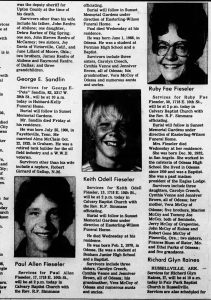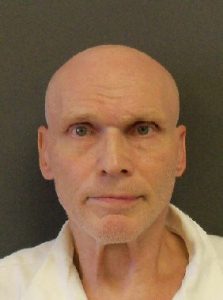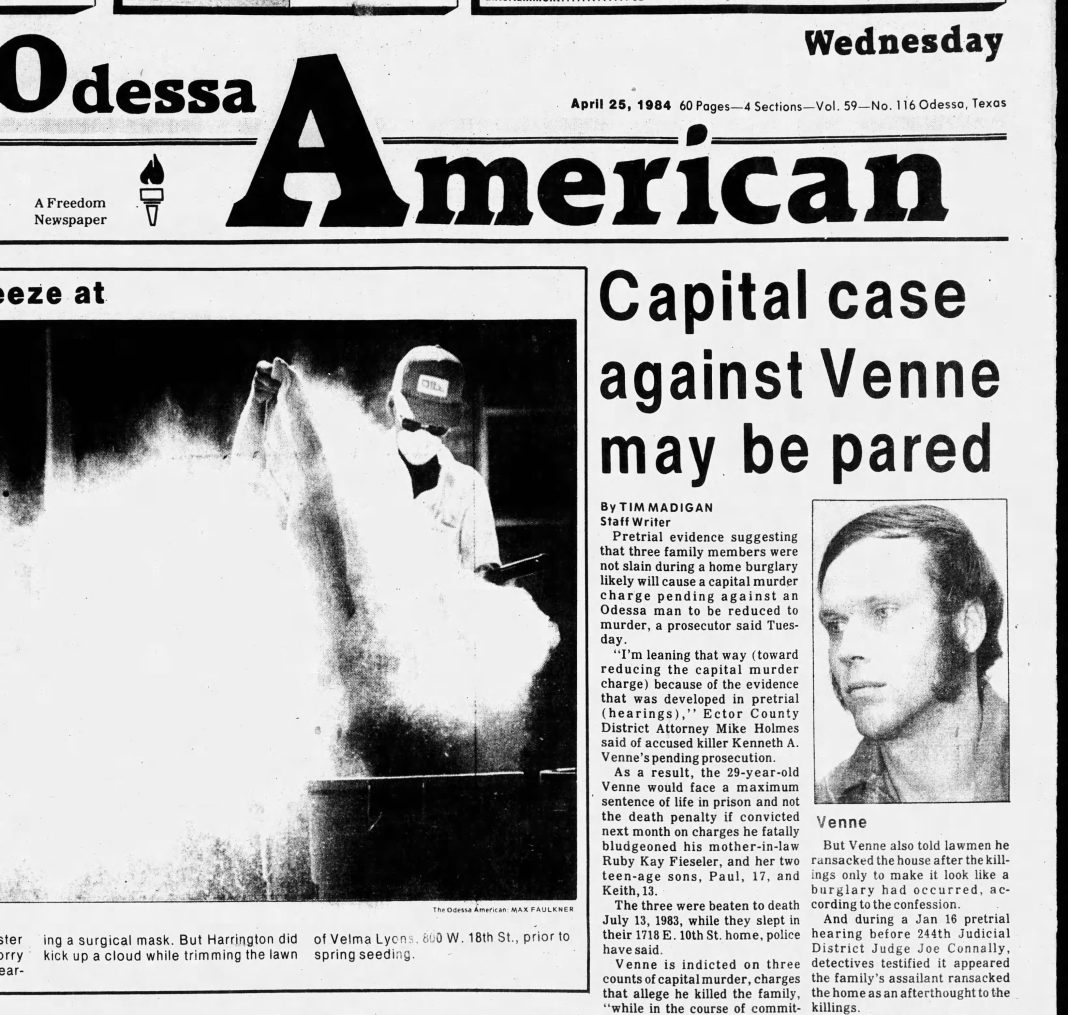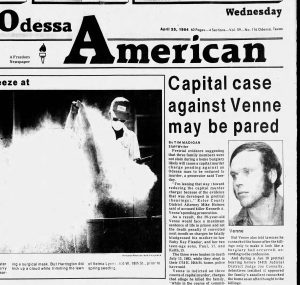Thirty-nine years after using a baseball bat to kill his mother-in-law and brothers-in-law, former Odessan Kenneth Venne is set to be released from the Texas Department of Corrections Wednesday.

Venne, 68, pleaded guilty to the July 13, 1983, murders of Ruby Kay Fieseler, 50, and her sons, Paul, 17, and Keith, 13, and was sentenced to three concurrent 55-year terms by Ector County District Court Judge Joe Connally.
Authorities said Venne broke into the Fieseler home on East 10th Street, beat the three to death as they slept with an aluminum bat and ransacked the house to make it appear as though it had been burglarized.
Ruby, a widow, worked in the Odessa High School cafeteria for six years prior to her death. She was survived by three daughters, five brothers, two sisters, her mother and five grandsons.
Venne’s plea agreement angered many members of the victims’ family. Venne’s wife, Cindy, who filed for divorce after the slayings, took out an advertisement lambasting then Ector County District Attorney Mike Holmes and supporting his opponent in the November 1984 election, Eric Augesen. Holmes went on to lose the election by 722 votes.
In her ad, Cindy claimed Holmes had promised to take the case to trial and seek the maximum sentence possible.
“This man could be out on the street in your life time. It’s time for a change,” Cindy Parrish Green wrote in her ad.

With Venne being just days away from release, others are now sounding the alarm.
“He’s an idiot and there’s no telling what he would do if someone crossed him,” said Jerry McCoy, one of Ruby’s brothers.
The 83-year-old St. Jo resident reached out to the Odessa American hoping the paper would alert Ector County residents as to Venne’s release.
Despite the years gone by, McCoy remains angered by the plea agreement offered to Venne.
“We were told he was going to get the needle and he didn’t,” McCoy said. “I can’t believe they gave him a deal for three murders with a baseball bat. What kind of a deal is that?”
He will never forgive Venne for his actions, McCoy said.
“Maybe for one, but three? No,” McCoy said.
One of his sisters, now 79, is afraid Venne will find her and if that happens, McCoy said she’s likely to shoot Venne. They’ve asked the state to order Venne refrain from contacting any of their family members.
McCoy remembers Ruby as being a great mom and great sister who would always host family Thanksgiving and Christmas gatherings for her siblings, children and grandchildren. Things were never the same after the slayings, he said.
Cindy moved to Arizona with her two children after the slayings, wrongly believing the rest of the family blamed her for the deaths, McCoy said. She died several years ago of breast cancer, he said.
“She thought everyone hated her and that she had something to do with it,” McCoy said. “I told her ‘Cynthia, no one thinks that and if they do they’re idiots.’”
He often wonders why Venne did what he did, but knows he’ll likely never learn the answer.
“At times it’s really been rough and other times you get busy living life only to get hit with it again,” McCoy said.
Modelle Gonzalez is also angry about Venne’s pending release. She attended Dowling Elementary School with Keith and remembers him always making people laugh.
She now lives outside Austin and she started a change.org petition asking Gov. Greg Abbott to ensure Venne serve his complete sentence. It’s been signed by more than 1,800 people.
After the slayings, Gonzalez said she couldn’t sleep by herself, fearing the killer would come after her, too.
“He was this monster in my head for years and years and years,” Gonzalez said.
She eventually became a crime scene specialist, probably due to the impact the Fieselers’ deaths had on her, she said.
As an adult, she researched the case using newspaper archives and was appalled at how it was handled, Gonzalez said.
Venne should have received the death penalty, Gonzalez said.
“I’ve tried to reach out to him to talk to him, but he won’t answer my letters,” Gonzalez said. “I think I wanted to close something in my own brain. I wanted to see if he’s sorry for what he’s done.”
She also wanted to know why he felt the need to arm himself while in prison, she said.
According to TDOC records, Venne was twice sentenced to four additional years in prison for carrying a deadly weapon. The first time Venne was caught with a weapon was in November 1990 and the second time was in October 1997.
Gonzalez wonders if Venne was scared in prison or if he had some nefarious reason for arming himself.
While Holmes doesn’t recall all of the details of the case, he doesn’t believe Venne wasn’t eligible for the death penalty.
Someone charged with committing a murder during the commission of a burglary could be charged with capital murder, but he thought the evidence showed Venne faked the burglary, Holmes said.
Moreover, Holmes said that as “insane” as it sounds, people accused of committing multiple murders were not eligible at that time for the death penalty if no other crimes were alleged. He and other prosecutors later fought to broaden the definition of capital murder and were successful, he said.
According to Odessa American archives, Venne told his attorney he wasn’t advised of his Miranda Rights, but he confessed so he wouldn’t be charged with capital murder. Venne also told police he had “shot up some bathtub speed” the day of the killings.
As for the plea agreement, Holmes said he and his assistant district attorney at the time seem to recall they were worried about getting a conviction at trial, but can’t remember why.
In any event, if Venne had received a life sentence, the maximum sentence he would have served was 60 years and he could have been paroled after 30 years, Holmes said. As it turns out, Venne was sentenced to 55 years and thanks to his subsequent crimes, served 39.
“I thought 55 years was a good sentence even though it was a really heinous crime,” Holmes said.
Holmes recalled that at the time Odessa had earned the reputation for being the Murder Capital of the United States based on the number of murders per capita. Many of those cases were especially gruesome, he recalled.
“It was just hellacious,” Holmes said.





